The education came from looking at the evidence that peaceful and idyllic Peleliu was the site of the bloodiest battle of World War II. In a two-month period beginning September 1944, tiny Peleliu (six to twenty-four square miles, depending on how you measure the mangrove swamps) hosted the deaths of 1,800 Americans (1,500 Marines and 300 Army), and almost every last one of its 11,000 Japanese soldier occupying force.
To put these numbers in perspective, more Americans were killed in less than two full months on Peleliu than were killed in the first two full years of fighting in Iraq, and the 1,800 dead are more than half the total killed in combat in Iraq since the war began five years ago.
With all the killed, I went to look for the crosses marking or commemorating their deaths.
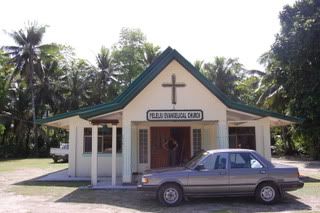
We found this one on the Peleliu Evangelical Church, just across from our bungalow in Storyboard Beach Resort.
About a half mile south we found a cemetery with many crosses, but none seemed to have anything to do with the epic battle to wrest Peleliu from the Japanese in 1944.
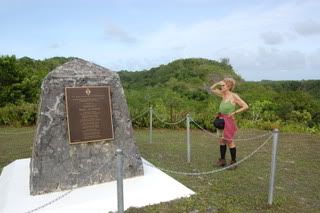
Near Bloody Nose Ridge, the scene of the bloodiest fighting, we found this modest memorial to American combat dead. On this face of the memorial are listed Medal of Honor recipients; five of the eight were awarded posthumously.
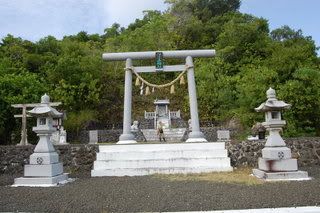
Nearby was a less modest Shinto shrine, a memorial to Japanese dead. You can get a good idea of size when you compare Alice standing in the middle of this Japanese shrine to her standing by the Marine memorial.
At the rear right center is a plaque shown in the following picture that reads: “Tourists from every country who visit this island should be told how courageous and patriotic were the Japanese soldiers who all died defending this island.
Pacific Fleet Commander in Chief (USA) C. W. Nimitz (Built Nov. 24, 1994)”
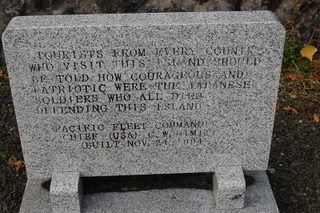
Where are the crosses?
Alice and I had walked and biked all over Peleliu and hadn't found any crosses marking the final resting places of almost 2,000 brave Marines and GIs.
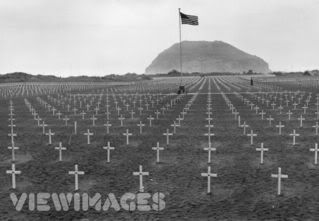
These are the crosses in the Marine cemetery on Iwo Jima, with Mount Suribachi in the distance. American casualties on Iwo Jima were greater than the total Allied casualties at the Battle of Normandy on D-Day. This photo was taken in 1945. Those killed in the battle for Peleliu in 1944 wouldn’t be buried here.
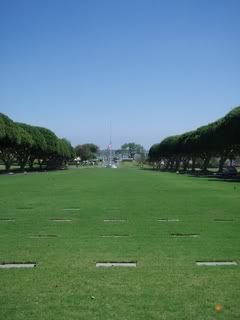
They were probably buried in Punchbowl Military Cemetery on Oahu, with a cross or Star of David on the grave marker. Punchbowl was one of the most popular stops for Japanese tour groups when I was stationed at Hickam Air Force Base 1978-1982.
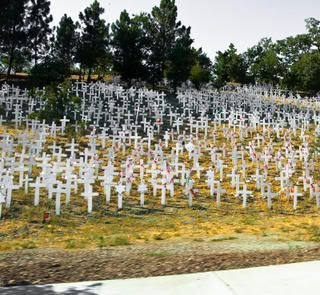
Anti-war activists have placed crosses (and Stars of David, but apparently no Islamic crescents) for US soldiers killed in Iraq on a hillside across from the BART (Bay Area Rapid Transit) station in Lafayette, California, which is about 20 miles east of San Francisco.
I’m grateful that there are so few.
During the last year of LBJ’s presidency, more Americans were killed in each two-month period in Vietnam than in five years of combat in Iraq.
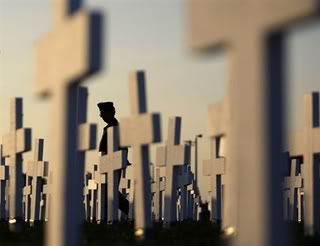
A Cuban-American walks next to crosses in a symbolic cemetery at the Tamiami Park in Coral Gables, Miami February 16, 2008. Cuban exiles placed more than 10,000 crosses in the park to honor loved ones who died fighting Castro's government or trying to cross the ocean to the United States.
REUTERS/Carlos Barria
I wonder who is putting up crosses for the hundreds of thousands killed in Sudan by Muslim terrorists, Stars of David for the thousands of innocent Israeli civilians slaughtered by Palestinian suicide bombers, or crescents for the hundreds of thousands of Muslims killed by other Muslims all over the world?
The attention of the American press given to symbols of grief and commemoration seem very selective and only involve anti-Bush activists. The greater suffering in the rest of the world is ignored.
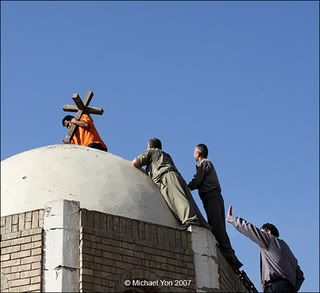
Christians and Muslims join together to repair a cross on a church in Baghdad.
Some crosses are easier to bear.
No comments:
Post a Comment